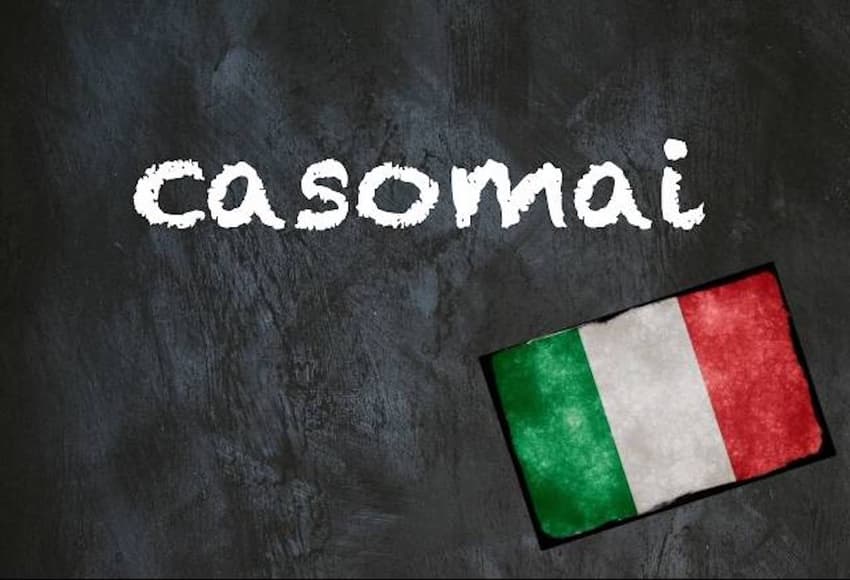Italian word of the day: 'Casomai'

You never know when this word might come in handy.
This word is about preparing for every eventuality, however unlikely.
Casomai (click here to hear it pronounced) is a contraction of caso mai, which individually mean 'case' and 'never/ever' and put together add up to 'in case'.
You can also use the more obvious translations in caso or nel caso, but casomai makes whatever you're talking about sound that bit less expected to happen – like saying 'if ever'.
Casomai tornerai da queste parti, vienici a trovare.
If ever you're back in these parts, come and see us.
Grammar fiends will know that when you're talking about a hypothetical possibility in Italian you often have to use the subjunctive, or congiuntivo. That's the case with casomai too – though not in the example above, since you're using the future tense to describe something that may well happen at some point down the line.
If you don't necessarily see it happening at all, though, you'll need to switch into the subjective.
Casomai io non fossi in casa, vieni a cercarmi in ufficio.
On the off chance I'm not at home, come and find me at the office.
Casomai tu ne avessi bisogno, le chiavi sono qua.
If you should need them, the keys are here.
To make things more confusing, you'll notice that in these examples it's not even the regular old present subjunctive (sia, abbia) but the imperfect subjunctive (fossi, avessi).
That's because Italian uses tenses in a particular order when you're talking about two conditional possibilities in the same sentence ('if x, then y'). We actually have a similar pattern in English, we just tend not to notice it – think about this sentence, for example: 'If I were rich, I would buy an apartment by the Spanish Steps'. Find an explanation here.
If that's too much to bite off at once, you'll be reassured to know that there's another way you can use casomai without a subjunctive in sight.
In certain contexts it also means 'if needs be', when you're laying out what you'll do if things don't go as you expect. In this case you can avoid the subjunctive because you're simply describing a back-up plan without going into whatever hypothetical events might have to happen to make it necessary.
Non venire – casomai passo io da te.
Don't come – if needs be I'll come to you.
Credo di fare in tempo. Casomai prenderò un taxi.
I think I'll make it in time, but I'll get a taxi if needs be.
And with that, you're covered for every possibility.
Do you have an Italian word you’d like us to feature? If so, please email us with your suggestion.
Comments
See Also
This word is about preparing for every eventuality, however unlikely.
Casomai (click here to hear it pronounced) is a contraction of caso mai, which individually mean 'case' and 'never/ever' and put together add up to 'in case'.
You can also use the more obvious translations in caso or nel caso, but casomai makes whatever you're talking about sound that bit less expected to happen – like saying 'if ever'.
Casomai tornerai da queste parti, vienici a trovare.
If ever you're back in these parts, come and see us.
Grammar fiends will know that when you're talking about a hypothetical possibility in Italian you often have to use the subjunctive, or congiuntivo. That's the case with casomai too – though not in the example above, since you're using the future tense to describe something that may well happen at some point down the line.
If you don't necessarily see it happening at all, though, you'll need to switch into the subjective.
Casomai io non fossi in casa, vieni a cercarmi in ufficio.
On the off chance I'm not at home, come and find me at the office.
Casomai tu ne avessi bisogno, le chiavi sono qua.
If you should need them, the keys are here.
To make things more confusing, you'll notice that in these examples it's not even the regular old present subjunctive (sia, abbia) but the imperfect subjunctive (fossi, avessi).
That's because Italian uses tenses in a particular order when you're talking about two conditional possibilities in the same sentence ('if x, then y'). We actually have a similar pattern in English, we just tend not to notice it – think about this sentence, for example: 'If I were rich, I would buy an apartment by the Spanish Steps'. Find an explanation here.
If that's too much to bite off at once, you'll be reassured to know that there's another way you can use casomai without a subjunctive in sight.
In certain contexts it also means 'if needs be', when you're laying out what you'll do if things don't go as you expect. In this case you can avoid the subjunctive because you're simply describing a back-up plan without going into whatever hypothetical events might have to happen to make it necessary.
Non venire – casomai passo io da te.
Don't come – if needs be I'll come to you.
Credo di fare in tempo. Casomai prenderò un taxi.
I think I'll make it in time, but I'll get a taxi if needs be.
And with that, you're covered for every possibility.
Do you have an Italian word you’d like us to feature? If so, please email us with your suggestion.

Join the conversation in our comments section below. Share your own views and experience and if you have a question or suggestion for our journalists then email us at [email protected].
Please keep comments civil, constructive and on topic – and make sure to read our terms of use before getting involved.
Please log in here to leave a comment.